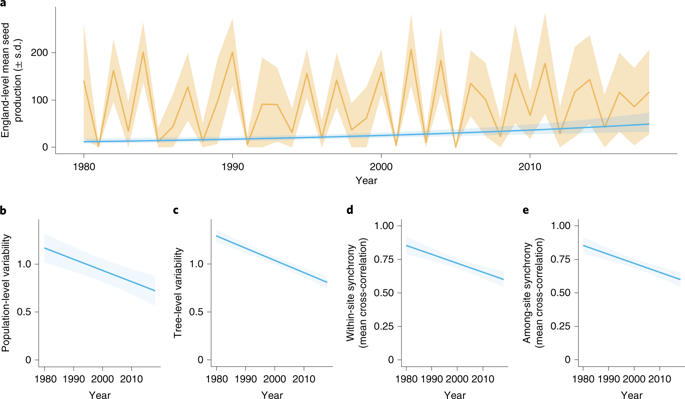Nature Plants ( IF 15.8 ) Pub Date : 2020-02-10 , DOI: 10.1038/s41477-020-0592-8 Michał Bogdziewicz 1 , Dave Kelly 2 , Peter A Thomas 3 , Jonathan G A Lageard 4 , Andrew Hacket-Pain 5

|
Many plants benefit from synchronous year-to-year variation in seed production, called masting. Masting benefits plants because it increases the efficiency of pollination and satiates predators, which reduces seed loss. Here, using a 39-year-long dataset, we show that climate warming over recent decades has increased seed production of European beech but decreased the year-to-year variability of seed production and the reproductive synchrony among individuals. Consequently, the benefit that the plants gained from masting has declined. While climate warming was associated with increased reproductive effort, we demonstrate that less effective pollination and greater losses of seeds to predators offset any benefits to the plants. This shows that an apparently simple benefit of climate warming unravels because of complex ecological interactions. Our results indicate that in masting systems, the main beneficiaries of climate-driven increases in seed production are seed predators, not plants.
中文翻译:

气候变暖破坏了欧洲山毛榉的桅杆播种及其对健康的益处
许多植物受益于种子生产的逐年同步变化,称为肥大。桅杆使植物受益,因为它提高了授粉效率并满足了捕食者的需求,从而减少了种子损失。在这里,我们使用长达 39 年的数据集表明,近几十年来的气候变暖增加了欧洲山毛榉的种子产量,但降低了种子产量的逐年变异性和个体之间的生殖同步性。因此,植物从肥大中获得的好处已经下降。虽然气候变暖与繁殖努力的增加有关,但我们证明授粉效率较低和捕食者对种子的更多损失抵消了对植物的任何好处。这表明,由于复杂的生态相互作用,气候变暖的一个明显简单的好处逐渐消失。











































 京公网安备 11010802027423号
京公网安备 11010802027423号